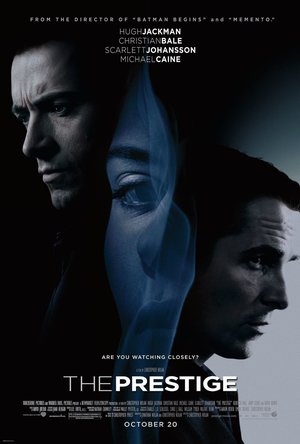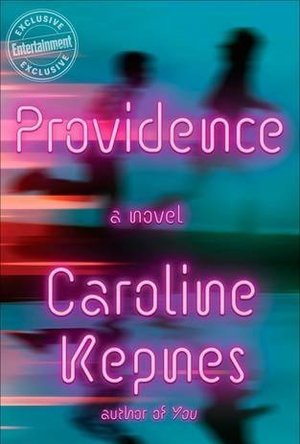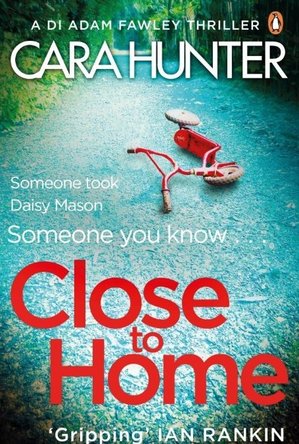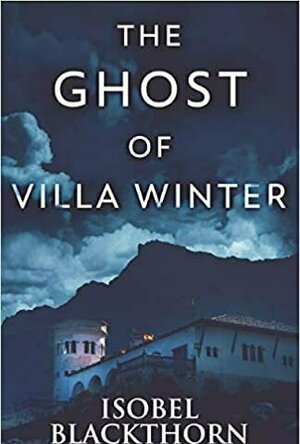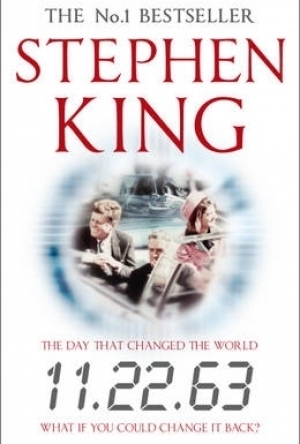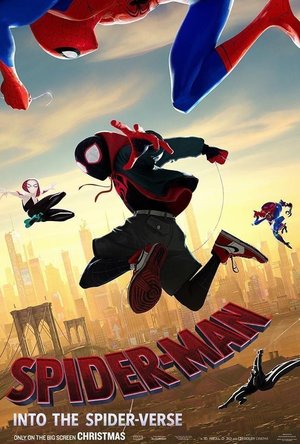Search
BankofMarquis (1832 KP) rated The Prestige (2006) in Movies
Mar 22, 2018
Underrated and underseen gem
Along with INSOMNIA, the 2006 film that Nolan directed, THE PRESTIGE is probably one of his least known and least viewed films and that is too bad for it is a wonderful motion picture that proves he is a strong director with a strong vision.
Dubbed "The Warring Magicians" film, THE PRESTIGE stars Christian Bale and Hugh Jackman as two 19th Century Magicians who are...well...at war with each other. Of course, they started out as partners, but soon became enemies, each trying to out do each other and to discover the other magician's secrets.
Cleverly written by Nolan and his frequent collaborator, his brother Jonathan Nolan - and based on the novel by Christopher Priest, THE PRESTIGE will keep you guessing throughout, trying to figure out "how they did it" and are constantly being surprised by double turns, back stabbing and second guessing.
Bale, by this time in his career, has established himself as a powerful actor - and he shines here. Joining Bale is Nolan regular Michael Caine as the mentor of the two magicians, a young-ish Scarlett Johannsen as a a woman who falls in love with both of them (of course) and Rebecca Hall and Piper Perabo as Bale's and Jackman's wives, respectively. But...the surprise to me in this film when I first saw it - and again when I recently re-viewed it - is the performance of Hugh Jackman. This film shows that Jackman is more than just Wolverine - that dude can act. As a magician, he is showing glimpses of being "THE GREATEST SHOWMAN" (but that is another movie for another day) and more than holds his own against a fierce Bale. Finally...special notice needs to be made to the actor who portrays inventor Nikola Tesla - perfectly cast in this role is Ziggy Stardust himself, David Bowie. It's a shame that Bowie did not act in more films for he captures the screen in the brief appearances he makes in this film.
As for Nolan - he is now coming into his own as a Director. The action is fast paced, the twists and turns are "honestly" played, the composition of the pictures on the screen are interesting and beautiful to look at and I walked away satisfied.
If you haven't seen THE PRESTIGE (or if you haven't seen it in awhile) - check this one out. You'll be glad you did.
Letter Grade: A (and...that's a surprise to me, I figured it would be a B+/A- film)
9 (out of 10) stars and you can take that to the Bank (ofMarquis)
Dubbed "The Warring Magicians" film, THE PRESTIGE stars Christian Bale and Hugh Jackman as two 19th Century Magicians who are...well...at war with each other. Of course, they started out as partners, but soon became enemies, each trying to out do each other and to discover the other magician's secrets.
Cleverly written by Nolan and his frequent collaborator, his brother Jonathan Nolan - and based on the novel by Christopher Priest, THE PRESTIGE will keep you guessing throughout, trying to figure out "how they did it" and are constantly being surprised by double turns, back stabbing and second guessing.
Bale, by this time in his career, has established himself as a powerful actor - and he shines here. Joining Bale is Nolan regular Michael Caine as the mentor of the two magicians, a young-ish Scarlett Johannsen as a a woman who falls in love with both of them (of course) and Rebecca Hall and Piper Perabo as Bale's and Jackman's wives, respectively. But...the surprise to me in this film when I first saw it - and again when I recently re-viewed it - is the performance of Hugh Jackman. This film shows that Jackman is more than just Wolverine - that dude can act. As a magician, he is showing glimpses of being "THE GREATEST SHOWMAN" (but that is another movie for another day) and more than holds his own against a fierce Bale. Finally...special notice needs to be made to the actor who portrays inventor Nikola Tesla - perfectly cast in this role is Ziggy Stardust himself, David Bowie. It's a shame that Bowie did not act in more films for he captures the screen in the brief appearances he makes in this film.
As for Nolan - he is now coming into his own as a Director. The action is fast paced, the twists and turns are "honestly" played, the composition of the pictures on the screen are interesting and beautiful to look at and I walked away satisfied.
If you haven't seen THE PRESTIGE (or if you haven't seen it in awhile) - check this one out. You'll be glad you did.
Letter Grade: A (and...that's a surprise to me, I figured it would be a B+/A- film)
9 (out of 10) stars and you can take that to the Bank (ofMarquis)
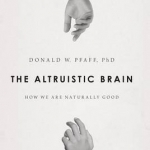
The Altruistic Brain: How We are Naturally Good
Book
Since the beginning of recorded history, law and religion have provided "rules" that define good...
MaryAnn (14 KP) rated Revealed (Intrigue under Western Skies) (Volume 3) in Books
Mar 5, 2019
Nothing can be hidden that won’t be revealed.
When her father dies, Katherine Levinson discovers her parents have kept secrets that render her happy childhood a farce. She and her gravely ill mother face eviction, and she has no choice but to appeal to the brother she’s never seen, the famous cattle baron, Rhyan Cason. Over her gravely ill mother’s objections, they move to Nebraska and the sprawling cattle ranch, Sollano.
Instead of the warm welcome, Katherine expects, she and her mother are met with whispers and scorn in the little prairie town near Sollano. Gradually, the sins of her parents’ past surface
and Katherine begins to doubt her very identity. With her brother busy with cattle rustlers and her mother too ill to be bothered, Katherine turns to Colt Holliman, a soft-spoken neighboring rancher, for comfort.
Tired of waiting for the right woman to come along, Colt has promised to wait for Charley Ryder, an acclaimed female sharpshooter and equestrian acrobat with the Wild West Show, but it’s becoming clear Charley loves the show more than him. As his attraction to Katherine grows, he finds himself spiritually conflicted. How can he break from past commitments and follow his heart?
Then unexpected danger strikes, testing Katherine’s and Colt’s faith in God—and each other.
My Thoughts: This was a delightful novel to read, the storyline is based in Nebraska. Nebraska is known for their corn, beef , horses ,rodeos and sugar beets! I lived in Nebraska and this brought back some great memories for me. The author has done a phenomenal job of bringing the reader into the ranching life. I love that she brings in the Wild West shows as well, there is so much history from the west that people don't have any idea that living in the west is truly like and the author has given the reader a great glimpse of the history.
Katherine is such a loveable character, the reader feels her plight, her father has passed away, her mother is ill, there are bills to pay. What is she to do?
Katherine sends a letter to a brother she hasn't met which changes her life forever.
Katherine has many things to deal with, the lies that her parents told her, gossip, and of course love. How must it feel to fall in love with someone promised to another? will she repeat her mother's past?
It's not hard to fall in love with Colt. He is every woman's dream, including Katherine's but Colt is promised to Charley; who it seems cares more about herself than anyone else.
This is a novel full of love, mystery, and suspense. It also shows us what happens when the love of money and pride come into our lives. It also teaches us that we must lean on God for everything and to turn to him when times get troubled.
I enjoyed the author's writing and will certainly be looking forward to reading more from Elaine Manders.
When her father dies, Katherine Levinson discovers her parents have kept secrets that render her happy childhood a farce. She and her gravely ill mother face eviction, and she has no choice but to appeal to the brother she’s never seen, the famous cattle baron, Rhyan Cason. Over her gravely ill mother’s objections, they move to Nebraska and the sprawling cattle ranch, Sollano.
Instead of the warm welcome, Katherine expects, she and her mother are met with whispers and scorn in the little prairie town near Sollano. Gradually, the sins of her parents’ past surface
and Katherine begins to doubt her very identity. With her brother busy with cattle rustlers and her mother too ill to be bothered, Katherine turns to Colt Holliman, a soft-spoken neighboring rancher, for comfort.
Tired of waiting for the right woman to come along, Colt has promised to wait for Charley Ryder, an acclaimed female sharpshooter and equestrian acrobat with the Wild West Show, but it’s becoming clear Charley loves the show more than him. As his attraction to Katherine grows, he finds himself spiritually conflicted. How can he break from past commitments and follow his heart?
Then unexpected danger strikes, testing Katherine’s and Colt’s faith in God—and each other.
My Thoughts: This was a delightful novel to read, the storyline is based in Nebraska. Nebraska is known for their corn, beef , horses ,rodeos and sugar beets! I lived in Nebraska and this brought back some great memories for me. The author has done a phenomenal job of bringing the reader into the ranching life. I love that she brings in the Wild West shows as well, there is so much history from the west that people don't have any idea that living in the west is truly like and the author has given the reader a great glimpse of the history.
Katherine is such a loveable character, the reader feels her plight, her father has passed away, her mother is ill, there are bills to pay. What is she to do?
Katherine sends a letter to a brother she hasn't met which changes her life forever.
Katherine has many things to deal with, the lies that her parents told her, gossip, and of course love. How must it feel to fall in love with someone promised to another? will she repeat her mother's past?
It's not hard to fall in love with Colt. He is every woman's dream, including Katherine's but Colt is promised to Charley; who it seems cares more about herself than anyone else.
This is a novel full of love, mystery, and suspense. It also shows us what happens when the love of money and pride come into our lives. It also teaches us that we must lean on God for everything and to turn to him when times get troubled.
I enjoyed the author's writing and will certainly be looking forward to reading more from Elaine Manders.
The nerdy birdie (67 KP) rated Providence: A Novel in Books
Jun 30, 2018
Brilliant!
Thank you to Netgalley and Simon & Schuster for allowing me to read an advance copy of "Providence"in exchange for an honest review ❤️??
Let me start off by saying that I was a bit of a "Nervous Nellie" going into this book because "You" by Caroline Kepnes makes my top ten favorite books of all times, and is by far my favorite thriller to date. I am always looking for a thriller novel to compare and while some have come dangerously close, no cigar.
Having said that...I have seen many mixed reviews regarding the topic of this book versus Kepnes's other novels. The subject varies drastically from her other fast-paced, edge-of-your-seat, pulse pounding reads! This is a book about so many things, including : love, turning a curse from something bad into good, how fate intervenes no matter what we would choose for ourselves, and how all of our lives can change in a split second.
When beginning this book I immediately started thinking ----this is definitely NOT the type of book I would ever pick up--I typically do not enjoy any type of science fiction and all things having to do with superpowers just are NOT my thing! I like villains like Harley Quinn and Joker. But...because it was written by one of my favorite authors ---I stuck around and I'm so happy that I did!
I flew through this book! The entire time I found myself rooting for this stolen boy, this monster, the underdog! I have taken away So many quotes ( you can find a few on my goodreads page) such as ..." Being alive is nothing without being able to live." My Dad faces this every single time he heads to the hospital to get his weekly chemo treatment. I can sympathize with Eggs and his illness and Lo reminding to eat, to check this, check that--- I can also see how a relationship based solely on messaging can supersede any other form of love if it's the right person.
Highly highly recommend this book, I don't want to spoil too much-- thank you for opening up my eyes to another genre. It's action meets romance meets science fiction meets superhuman?
To Caroline Kepnes: thank you for calling those delectable things you put on ice cream jimmies and NOT sprinkles, thank you for opening my eyes to the world of H.P. Lovecraft, for using my favorite quote ever by E.E. Cummings in this novel & and for leaving me with an undeniable urge to hit the store for strawberries, fluff, and a cookie scented candle.
Kepnes has a way of reaching out to you as if you are her only reader no matter what the topic may be--- please give this book a shot, she has proved she isn't a one hit wonder and can write about anything she puts her mind to!
I am Providence.
Let me start off by saying that I was a bit of a "Nervous Nellie" going into this book because "You" by Caroline Kepnes makes my top ten favorite books of all times, and is by far my favorite thriller to date. I am always looking for a thriller novel to compare and while some have come dangerously close, no cigar.
Having said that...I have seen many mixed reviews regarding the topic of this book versus Kepnes's other novels. The subject varies drastically from her other fast-paced, edge-of-your-seat, pulse pounding reads! This is a book about so many things, including : love, turning a curse from something bad into good, how fate intervenes no matter what we would choose for ourselves, and how all of our lives can change in a split second.
When beginning this book I immediately started thinking ----this is definitely NOT the type of book I would ever pick up--I typically do not enjoy any type of science fiction and all things having to do with superpowers just are NOT my thing! I like villains like Harley Quinn and Joker. But...because it was written by one of my favorite authors ---I stuck around and I'm so happy that I did!
I flew through this book! The entire time I found myself rooting for this stolen boy, this monster, the underdog! I have taken away So many quotes ( you can find a few on my goodreads page) such as ..." Being alive is nothing without being able to live." My Dad faces this every single time he heads to the hospital to get his weekly chemo treatment. I can sympathize with Eggs and his illness and Lo reminding to eat, to check this, check that--- I can also see how a relationship based solely on messaging can supersede any other form of love if it's the right person.
Highly highly recommend this book, I don't want to spoil too much-- thank you for opening up my eyes to another genre. It's action meets romance meets science fiction meets superhuman?
To Caroline Kepnes: thank you for calling those delectable things you put on ice cream jimmies and NOT sprinkles, thank you for opening my eyes to the world of H.P. Lovecraft, for using my favorite quote ever by E.E. Cummings in this novel & and for leaving me with an undeniable urge to hit the store for strawberries, fluff, and a cookie scented candle.
Kepnes has a way of reaching out to you as if you are her only reader no matter what the topic may be--- please give this book a shot, she has proved she isn't a one hit wonder and can write about anything she puts her mind to!
I am Providence.
Ivana A. | Diary of Difference (1171 KP) rated Close to Home in Books
Oct 2, 2020
Close To Home is, I believe, the first mystery/thriller book I have given one star to. I had very high hopes for this one. And it crashed my hopes quite hard.
Close To Home is the first book in a series called DI Adam Fawley. The books are not related to themselves and can be read as standalones. They all feature the detective Fawley, therefore the series solution. Something similar to Dan Brown's series. I listened to the audio book, and I think that the format might have a little blame on my rating.
In this book, the 8-year-old girl Daisy Mason disappears from her parents's summer party. No one in the neighbourhood saw anything, not even the parents, and the detective is trying to keep an open mind in this whole situation, as someone is clearly lying.
The story begins with an interesting premise, and I loved the initial interviews that are happening, right after the disappearance. And after this initial moment, everything goes downhill.
There are many twists in this book, and they all are happening based on dumn luck or weird circumstances.
I would understand if this happened once or twice, but they have solved the whole mystery with coincidences happening one after another as well as random plot lines being added in the middle of nowhere, just to keep the story going.
Oh - we're running out of clues. Let's add a secret random second family the dad has. Oh - we're running out of clues again. Let's add a suspicious background for the mother. And now, let's make both these events come up at them at the same time, right when we're trying to solve an investigation. And now, let's add a mental issue with the brother. (Despite receiving all doctor's reports at the beginning)...
Too many events that came up afterwards and that I still have trouble to believe could make sense.
And on top of all this, I need to mention that the book doesn't have chapters as such. The parts are split with excerpts from social media. Something which I truly believe I would have enjoyed if I read the book. But instead, I was listening to it. And it is so annoying.
The below excerpt is not a quote, as I don't have the paperback copy. However, it does represent the true format of how this sounded in the audiobook:
Twenty-ninth of October, nine twenty five.
Angela G Bettaton at angela dot g bettaton. I hope they find the person that took Daisy. Hashtag Daisy Mason. Hashtag Find Daisy.
Mike eighty seven at mike dot eight seven The person that did this should take responsibility. Hashtag Find Daisy. Hashtag Missing Girl.
The ending - it just wasn't worth the wait, and it was the most unsatisfying ending I have ever encountered in mystery novels.
I regret picking this book up and I regret reading it. I really wish I love it, as I was looking forward to Cara Hunter's new novel, but now, I am not so sure anymore.
If you think you might enjoy it, please pick it up! Perhaps you might love it, who knows!
Close To Home is the first book in a series called DI Adam Fawley. The books are not related to themselves and can be read as standalones. They all feature the detective Fawley, therefore the series solution. Something similar to Dan Brown's series. I listened to the audio book, and I think that the format might have a little blame on my rating.
In this book, the 8-year-old girl Daisy Mason disappears from her parents's summer party. No one in the neighbourhood saw anything, not even the parents, and the detective is trying to keep an open mind in this whole situation, as someone is clearly lying.
The story begins with an interesting premise, and I loved the initial interviews that are happening, right after the disappearance. And after this initial moment, everything goes downhill.
There are many twists in this book, and they all are happening based on dumn luck or weird circumstances.
I would understand if this happened once or twice, but they have solved the whole mystery with coincidences happening one after another as well as random plot lines being added in the middle of nowhere, just to keep the story going.
Oh - we're running out of clues. Let's add a secret random second family the dad has. Oh - we're running out of clues again. Let's add a suspicious background for the mother. And now, let's make both these events come up at them at the same time, right when we're trying to solve an investigation. And now, let's add a mental issue with the brother. (Despite receiving all doctor's reports at the beginning)...
Too many events that came up afterwards and that I still have trouble to believe could make sense.
And on top of all this, I need to mention that the book doesn't have chapters as such. The parts are split with excerpts from social media. Something which I truly believe I would have enjoyed if I read the book. But instead, I was listening to it. And it is so annoying.
The below excerpt is not a quote, as I don't have the paperback copy. However, it does represent the true format of how this sounded in the audiobook:
Twenty-ninth of October, nine twenty five.
Angela G Bettaton at angela dot g bettaton. I hope they find the person that took Daisy. Hashtag Daisy Mason. Hashtag Find Daisy.
Mike eighty seven at mike dot eight seven The person that did this should take responsibility. Hashtag Find Daisy. Hashtag Missing Girl.
The ending - it just wasn't worth the wait, and it was the most unsatisfying ending I have ever encountered in mystery novels.
I regret picking this book up and I regret reading it. I really wish I love it, as I was looking forward to Cara Hunter's new novel, but now, I am not so sure anymore.
If you think you might enjoy it, please pick it up! Perhaps you might love it, who knows!
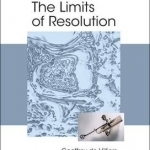
The Limits of Resolution
Book
"This beautiful book can be read as a novel presenting carefully our quest to get more and more...
Hadley (567 KP) rated The Ghost of Villa Winter in Books
Mar 12, 2021
A cult (1 more)
Description of environment
All of the characters (1 more)
Amateur writing mistakes
Little does the reader know when they pick up a copy of The Ghost of Villa Winter by Isobel Blackthorn that a cult is lurking about inside the pages.
We begin our journey with Clarissa ,our main character, boarding a tour bus where she lets her personality shine through, which turns out to be extremely judgmental of anyone who isn't like her, or doesn't fit into the categories she places them in. For example, the driver of the tour bus is automatically labeled by Clarissa as a bad man because he has an uneven face and a French accent, and much of the same is said about the other seven passengers, as well. When she finally manages to stop judging the passengers, readers find out that Clarissa is somewhat of a psychic: "Ghosts spoke a language of their own and if a member of the spirit world inhabited the abandoned abode, she was sure to pick up on it. She was never wrong in these matters. Only three of the thirty or more premises she'd investigated on so-called ghost tours had contained a legitimate ghost. She prided herself on her mediumistic prowess. She was apt to pick up on preternatural inhabitants of places said not to be haunted. Sometimes she thought she could singlehandedly re-write history based on information she had gleaned, but that was being arrogant. She followed her dreams and her visions and her intuition, that was all. A natural psychic and a cynic to boot. "
It turns out that Clarissa is on the tour to see if she can encounter any spirits that may be at the infamous Villa Winter; a place that is believed to have been a secret Nazi base, as well as a place for human experiments - - - the tower was also believed to have been used as a lighthouse for German U-boats - - - which, in reality, Villa Winter is an actual place that exists on the Canary Islands in Spain.
The Ghost of Villa Winter is the fourth book in Blackthorn's Canary Islands Mysteries series, but it can be easily read as an introduction to it because you don't need any background information to understand what is going on. The novel takes on the usual tropes of a murder-mystery plot (a body is found, people are stranded and trying to figure out who among them is the murderer). Agatha Christie is one of the best authors of the murder-mystery genre who loved using her knowledge of poisons in her stories - - - Blackthorn treats the tropes with the right amount of respect which makes The Ghost of Villa Winter a pretty good story.
My major complaint for the Ghost of Villa Winter are the characters, which I found every single one quite unlikable, and even by the end, I couldn't bring myself to care at all for Clarissa. The way that she judged everyone so harshly, and her viewpoint that if no one acted the way she wanted them to, she would believe something was wrong with them that needed to be addressed in a rude manner: "He was the most anxious man she had come across in a long time. Anxious, unsure of himself and preoccupied. Far too self-conscious. The way he'd aligned his plate at lunch. That was obsessive-compulsive. And he certainly couldn't handle Fred Spice. She was sure he could be charming with pretty young ladies, patronizing even, but around her he was awkward. It was clear, too, that he was broken. It wouldn't be easy being an author knowing as you aged that all of your success was behind you and your future held nothing but diminishment. Writing was one of those activities you could pursue until you dropped and many successful authors did just that. As irritating as he could be, she felt sorry for him. "
The other characters are all seen from Clarissa's viewpoint, so they come off quite annoying, but at one point it seemed like Blackthorn was trying to redeem Clarissa's negative qualities by making her an advocate for a possibly wrongly convicted man. This story line didn't come off as redemption for me, but rather to fuel Clarissa's need to be important and in the right. Blackthorn failed to make any of the characters grow above pettiness. If a reader doesn't have a character to root for, the story becomes unenjoyable - - - which is the main reason I gave the book such a low rating; the murder-mystery was interesting, but the characters were not.
The murder, a woman who may have been part of a cult, is found inside a nailed-up crate with a tattoo of a number on her body being one of the only clues that puts Clarissa into sleuth-mode. After believing that one of the tourists is the killer, she decides to keep the discovery of the murder between her and Richard - - - a crime author who came to Villa Winter in hopes of a book inspiration. The two slowly begin to investigate their fellow tourists to figure out who had the mind and motive to kill the young woman, but this doesn't seem to be as easy as it is in Richard's books. I did have a problem though with the ending which ends up being very reminiscent of a majority of short stories: the ending came abruptly and the pieces fell into a place that was unbelievable.
I had never read any of Blackthorn's books before, so I didn't have much of an expectation reading the Ghost of Villa Winter. Unfortunately, I came away from this one pretty dissatisfied because all of the interesting points in the story (such as the cult) are rarely shown/explored further. Also, the fact that 'ghost' is in the title, I was pretty let down with only a couple of scenes where a ghost actually shows up, one such short-lived scene: "She [Clarissa] was about to carry on when a figure appeared in one of the uppermost tower windows. Appeared, and then was gone. At least, what she thought to be a figure. Could have been a ghost. " The scenes are so short that I believe 'ghost' shouldn't be in the title because it's misleading.
With quite a few amateur writing mistakes, and unlikable characters, I don't think I will read anymore of the books in this series. I loved the idea of a cult murder and a haunting in a possible Nazi base, but too much of the focus in the story was on Clarissa's judgmental outlook on everything that it ended up not being the story it could have been. I can only recommend this book to people who want a quick murder-mystery (what most call the genre 'cozy mystery'), but for paranormal lovers, the ghosts practically disappeared within a few pages.
We begin our journey with Clarissa ,our main character, boarding a tour bus where she lets her personality shine through, which turns out to be extremely judgmental of anyone who isn't like her, or doesn't fit into the categories she places them in. For example, the driver of the tour bus is automatically labeled by Clarissa as a bad man because he has an uneven face and a French accent, and much of the same is said about the other seven passengers, as well. When she finally manages to stop judging the passengers, readers find out that Clarissa is somewhat of a psychic: "Ghosts spoke a language of their own and if a member of the spirit world inhabited the abandoned abode, she was sure to pick up on it. She was never wrong in these matters. Only three of the thirty or more premises she'd investigated on so-called ghost tours had contained a legitimate ghost. She prided herself on her mediumistic prowess. She was apt to pick up on preternatural inhabitants of places said not to be haunted. Sometimes she thought she could singlehandedly re-write history based on information she had gleaned, but that was being arrogant. She followed her dreams and her visions and her intuition, that was all. A natural psychic and a cynic to boot. "
It turns out that Clarissa is on the tour to see if she can encounter any spirits that may be at the infamous Villa Winter; a place that is believed to have been a secret Nazi base, as well as a place for human experiments - - - the tower was also believed to have been used as a lighthouse for German U-boats - - - which, in reality, Villa Winter is an actual place that exists on the Canary Islands in Spain.
The Ghost of Villa Winter is the fourth book in Blackthorn's Canary Islands Mysteries series, but it can be easily read as an introduction to it because you don't need any background information to understand what is going on. The novel takes on the usual tropes of a murder-mystery plot (a body is found, people are stranded and trying to figure out who among them is the murderer). Agatha Christie is one of the best authors of the murder-mystery genre who loved using her knowledge of poisons in her stories - - - Blackthorn treats the tropes with the right amount of respect which makes The Ghost of Villa Winter a pretty good story.
My major complaint for the Ghost of Villa Winter are the characters, which I found every single one quite unlikable, and even by the end, I couldn't bring myself to care at all for Clarissa. The way that she judged everyone so harshly, and her viewpoint that if no one acted the way she wanted them to, she would believe something was wrong with them that needed to be addressed in a rude manner: "He was the most anxious man she had come across in a long time. Anxious, unsure of himself and preoccupied. Far too self-conscious. The way he'd aligned his plate at lunch. That was obsessive-compulsive. And he certainly couldn't handle Fred Spice. She was sure he could be charming with pretty young ladies, patronizing even, but around her he was awkward. It was clear, too, that he was broken. It wouldn't be easy being an author knowing as you aged that all of your success was behind you and your future held nothing but diminishment. Writing was one of those activities you could pursue until you dropped and many successful authors did just that. As irritating as he could be, she felt sorry for him. "
The other characters are all seen from Clarissa's viewpoint, so they come off quite annoying, but at one point it seemed like Blackthorn was trying to redeem Clarissa's negative qualities by making her an advocate for a possibly wrongly convicted man. This story line didn't come off as redemption for me, but rather to fuel Clarissa's need to be important and in the right. Blackthorn failed to make any of the characters grow above pettiness. If a reader doesn't have a character to root for, the story becomes unenjoyable - - - which is the main reason I gave the book such a low rating; the murder-mystery was interesting, but the characters were not.
The murder, a woman who may have been part of a cult, is found inside a nailed-up crate with a tattoo of a number on her body being one of the only clues that puts Clarissa into sleuth-mode. After believing that one of the tourists is the killer, she decides to keep the discovery of the murder between her and Richard - - - a crime author who came to Villa Winter in hopes of a book inspiration. The two slowly begin to investigate their fellow tourists to figure out who had the mind and motive to kill the young woman, but this doesn't seem to be as easy as it is in Richard's books. I did have a problem though with the ending which ends up being very reminiscent of a majority of short stories: the ending came abruptly and the pieces fell into a place that was unbelievable.
I had never read any of Blackthorn's books before, so I didn't have much of an expectation reading the Ghost of Villa Winter. Unfortunately, I came away from this one pretty dissatisfied because all of the interesting points in the story (such as the cult) are rarely shown/explored further. Also, the fact that 'ghost' is in the title, I was pretty let down with only a couple of scenes where a ghost actually shows up, one such short-lived scene: "She [Clarissa] was about to carry on when a figure appeared in one of the uppermost tower windows. Appeared, and then was gone. At least, what she thought to be a figure. Could have been a ghost. " The scenes are so short that I believe 'ghost' shouldn't be in the title because it's misleading.
With quite a few amateur writing mistakes, and unlikable characters, I don't think I will read anymore of the books in this series. I loved the idea of a cult murder and a haunting in a possible Nazi base, but too much of the focus in the story was on Clarissa's judgmental outlook on everything that it ended up not being the story it could have been. I can only recommend this book to people who want a quick murder-mystery (what most call the genre 'cozy mystery'), but for paranormal lovers, the ghosts practically disappeared within a few pages.
I would rate this 3.5/5 stars.
I’ve never been able to find myself wanting to read Stephen King, and after a few attempts when I was younger to start one of his novels, I still couldn’t and so until this book I have never finished a Stephen King. I persevered through this one because it had been lent to me by a friend with a good review and I had watched the tv series based on it a few years ago.
The start of this novel was very slow and confused me in a few points (but I think that was intentional as our main character – Jake Epping – was also pretty confused at the same time). But because not much was happening, I kept putting the book down, distracted to do something else and really having to force myself to pick it back up. Once I managed to get to part 2, I found that I was much more interested in the story and the plot line and it wasn’t such a chore to make the time to read it. I then had a difficult time to put the book down, and most nights I was only putting it down because I was falling asleep in the middle of a sentence! I read the last quarter of the book in a day, because I just wanted to know what was going to happen and whether he was going to be able to stop the assassination of John F. Kennedy.
Overall, I found the concept very interesting and not just the time travel. I found the concept of the past not wanting to be changed and actively trying to stop someone from changing it interesting, and sometimes it was quite comical the amount of things that went wrong when Jake was trying to change the past. I did, however, find the ending very disappointing. It felt like it was starting to be set up for a different ending and then at the last minute the author decided to change it completely. It just didn’t seem to fit with the set up of the last chapter or so, but I can see why it was done and that the ending that was being set up wouldn’t work in terms of not changing the past.
A very interesting read, but with a disappointing ending, but I would still recommend it!
I’ve never been able to find myself wanting to read Stephen King, and after a few attempts when I was younger to start one of his novels, I still couldn’t and so until this book I have never finished a Stephen King. I persevered through this one because it had been lent to me by a friend with a good review and I had watched the tv series based on it a few years ago.
The start of this novel was very slow and confused me in a few points (but I think that was intentional as our main character – Jake Epping – was also pretty confused at the same time). But because not much was happening, I kept putting the book down, distracted to do something else and really having to force myself to pick it back up. Once I managed to get to part 2, I found that I was much more interested in the story and the plot line and it wasn’t such a chore to make the time to read it. I then had a difficult time to put the book down, and most nights I was only putting it down because I was falling asleep in the middle of a sentence! I read the last quarter of the book in a day, because I just wanted to know what was going to happen and whether he was going to be able to stop the assassination of John F. Kennedy.
Overall, I found the concept very interesting and not just the time travel. I found the concept of the past not wanting to be changed and actively trying to stop someone from changing it interesting, and sometimes it was quite comical the amount of things that went wrong when Jake was trying to change the past. I did, however, find the ending very disappointing. It felt like it was starting to be set up for a different ending and then at the last minute the author decided to change it completely. It just didn’t seem to fit with the set up of the last chapter or so, but I can see why it was done and that the ending that was being set up wouldn’t work in terms of not changing the past.
A very interesting read, but with a disappointing ending, but I would still recommend it!
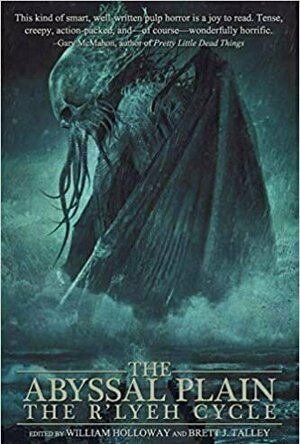
The Abyssal Plain: The R'lyeh Cycle
Book
With The Abyssal Plain, Holloway and Talley have managed to transform the Cthulhu Mythos into...
BankofMarquis (1832 KP) rated Spider-Man: Into the Spider-Verse (2018) in Movies
Dec 28, 2018
The first "true" comic book movie
The animated feature, SPIDERMAN: INTO THE SPIDER-VERSE, is the first, true "comic-book" film I have ever seen.
"But wait", you say, "How about the Marvel films? Or the DC Universe films? Or the X-Men or DeadPool? Aren't they Comic-Book films?".
I would have to answer - "no". At least not in the same way. All of those properties are films that are BASED on comic-books. Spider-verse, brilliantly, is a comic-book brought to life. It includes scenes that look like pages of a comic book (or graphic novel). It uses thought bubbles,sound effect words and abstract images. The characters are distorted and when other versions of the Spider-Verse are scene (not a spoiler: it's in the title), they are designed in a different graphic style.
Credit for this unique vision/type of film must start with the writers, Phil Lord (The Lego Movie) and Rodney Rothman (22 Jump Street) as well as Directors Bob Persischetti (in his Directing debut) and Rothman (again). These 3 brought to the screen a dazzling visual storytelling vision that is engrossing and interesting and (I am sure) will become richer and richer the more that this film is viewed.
This vision must have been apparent from the "get-go" as these 3 were able to load some top-notch voice talent into this film - Mahershala Ali, Hailee Steinfeld, Jake Johnson, Lily Tomlin(!), Zoe Kravitz, John Mulaney, Kathryn Hahn, Liev Schrieber, Chris Pine and good ol' Nicholas Cage all bring their "A" game to the voices, presenting (instantly) interesting, distinct characters to this interesting, distinct world.
The action of this film moves at a fast-pace, but not so fast that you get lost and the emotions of the film are strong, so the "slow" scenes are just as well paced and don't seem too slow.
I see alot of films, and it is rare when I am struck with how "unusual" a film is. And this one IS unusual - in a very good way. I was thoroughly entertained throughout and I cannot wait to see this film again to catch some of the things I missed the first time through and have a deeper and richer experience for knowing what is to come.
Letter Grade: A
9 (out of 10) stars (yes, it's that good!) and you can take this to the Bank(ofMarquis)
"But wait", you say, "How about the Marvel films? Or the DC Universe films? Or the X-Men or DeadPool? Aren't they Comic-Book films?".
I would have to answer - "no". At least not in the same way. All of those properties are films that are BASED on comic-books. Spider-verse, brilliantly, is a comic-book brought to life. It includes scenes that look like pages of a comic book (or graphic novel). It uses thought bubbles,sound effect words and abstract images. The characters are distorted and when other versions of the Spider-Verse are scene (not a spoiler: it's in the title), they are designed in a different graphic style.
Credit for this unique vision/type of film must start with the writers, Phil Lord (The Lego Movie) and Rodney Rothman (22 Jump Street) as well as Directors Bob Persischetti (in his Directing debut) and Rothman (again). These 3 brought to the screen a dazzling visual storytelling vision that is engrossing and interesting and (I am sure) will become richer and richer the more that this film is viewed.
This vision must have been apparent from the "get-go" as these 3 were able to load some top-notch voice talent into this film - Mahershala Ali, Hailee Steinfeld, Jake Johnson, Lily Tomlin(!), Zoe Kravitz, John Mulaney, Kathryn Hahn, Liev Schrieber, Chris Pine and good ol' Nicholas Cage all bring their "A" game to the voices, presenting (instantly) interesting, distinct characters to this interesting, distinct world.
The action of this film moves at a fast-pace, but not so fast that you get lost and the emotions of the film are strong, so the "slow" scenes are just as well paced and don't seem too slow.
I see alot of films, and it is rare when I am struck with how "unusual" a film is. And this one IS unusual - in a very good way. I was thoroughly entertained throughout and I cannot wait to see this film again to catch some of the things I missed the first time through and have a deeper and richer experience for knowing what is to come.
Letter Grade: A
9 (out of 10) stars (yes, it's that good!) and you can take this to the Bank(ofMarquis)
